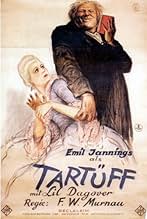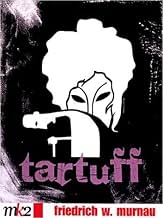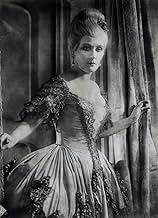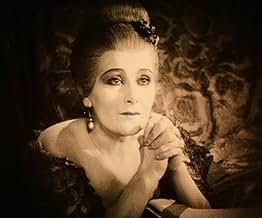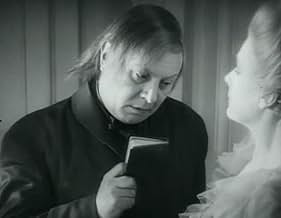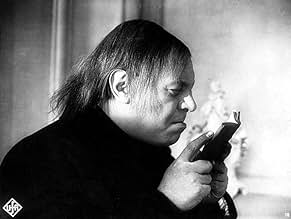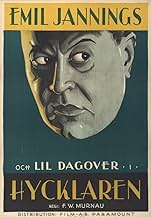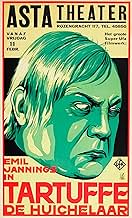VALUTAZIONE IMDb
7,1/10
2867
LA TUA VALUTAZIONE
Aggiungi una trama nella tua linguaA young man shows his millionaire grandfather a film based on Molière's Tartuffe, in order to expose the old man's hypocritical governess who covets his own inheritance.A young man shows his millionaire grandfather a film based on Molière's Tartuffe, in order to expose the old man's hypocritical governess who covets his own inheritance.A young man shows his millionaire grandfather a film based on Molière's Tartuffe, in order to expose the old man's hypocritical governess who covets his own inheritance.
- Regia
- Sceneggiatura
- Star
Recensioni in evidenza
The film begins with the story of a rich man being given a slow premature death by his money-grubbing housekeeper. The elderly man has shunned his actor grandson, who visits him and, after discovering the housekeepers use of poison, is sent away. He returns disguised as a travelling cinema worker, who, upon getting into his grandfather's house, proceeds to show them the story of Herr Tartuff. Rich landowner Herr Orgon (Werner Krauss) brings his new friend and religious fanatic Tartuffe (Emil Jannings) home, much to the dismay of Orgon's wife Frau Elmire (Lil Dagover). After she spurns Tartuffe's sexual advances, she sets out to prove to Orgon that Tartuffe is an imposter who is seeking to inherit Orgon's vast estate.
Why director F.W. Murnau decided to use the film-within-a-film device in his adaptation of Moliere's famous play, I'm not sure. Maybe it was to put his own new spin on what is now a well-known story and moral tale, or perhaps it is just to bring it up to date. Either way, it's an effective device, and allows Murnau to advertise his unbelievably advanced film-making techniques and ideas. His better known classics such as Nosferatu (1922) and Sunrise: A Song of Two Humans (1927) showed his ability for expressionism and breakthrough techniques, but Tartuffe displays his eye for the science of cinema. Every frame, every camera movement, and every cut is sheer beauty. And everything is helped by one of the giants of silent cinema, Emil Jannings.
Tartuffe is an absolute monster, and it needed a true monster to play him. Jannings is colossal - his hulking frame making him look like a kind of evil spectre, capable of anything (what a shame that Jannings would later commit career suicide by becoming Goebbels pet propaganda tool). The film takes some surprising risks (for its time) as well. During the opening scenes, before we are introduced to Tartuffe, we see the young grandson being booted out of the house. Then something amazing happens - he walks up to the camera and looks at us, the audience, smiling. He assures us that the matter is not finished, and that he will be back to avenge his grandfather. This was back in a time where directors felt they had to have the characters looking a certain way went conversing, and that camera shots had to be at a certain level, for fear the audience simply wouldn't understand what was happening. Directors were simply terrified to try new techniques, but not Murnau.
There is also a shocking scene involving the first exchanges between Tartuffe and Elmire. She is in the midst of demanding him to leave, when the camera droops down from her face, and lingers on her cleavage, which is slightly visible due to the way she is looking down upon Tartuffe. All is seen from Tartuffe's point of view, and this happens a number of times. Surprisingly saucy given it's age. Murnau is simply a genius, and you can watch almost any of his films to realise this. Tartuffe is not his best, and even if it seems to be breathlessly sprinting for the end in the final ten minutes, it is still a brilliant film.
www.the-wrath-of-blog.blogspot.com
Why director F.W. Murnau decided to use the film-within-a-film device in his adaptation of Moliere's famous play, I'm not sure. Maybe it was to put his own new spin on what is now a well-known story and moral tale, or perhaps it is just to bring it up to date. Either way, it's an effective device, and allows Murnau to advertise his unbelievably advanced film-making techniques and ideas. His better known classics such as Nosferatu (1922) and Sunrise: A Song of Two Humans (1927) showed his ability for expressionism and breakthrough techniques, but Tartuffe displays his eye for the science of cinema. Every frame, every camera movement, and every cut is sheer beauty. And everything is helped by one of the giants of silent cinema, Emil Jannings.
Tartuffe is an absolute monster, and it needed a true monster to play him. Jannings is colossal - his hulking frame making him look like a kind of evil spectre, capable of anything (what a shame that Jannings would later commit career suicide by becoming Goebbels pet propaganda tool). The film takes some surprising risks (for its time) as well. During the opening scenes, before we are introduced to Tartuffe, we see the young grandson being booted out of the house. Then something amazing happens - he walks up to the camera and looks at us, the audience, smiling. He assures us that the matter is not finished, and that he will be back to avenge his grandfather. This was back in a time where directors felt they had to have the characters looking a certain way went conversing, and that camera shots had to be at a certain level, for fear the audience simply wouldn't understand what was happening. Directors were simply terrified to try new techniques, but not Murnau.
There is also a shocking scene involving the first exchanges between Tartuffe and Elmire. She is in the midst of demanding him to leave, when the camera droops down from her face, and lingers on her cleavage, which is slightly visible due to the way she is looking down upon Tartuffe. All is seen from Tartuffe's point of view, and this happens a number of times. Surprisingly saucy given it's age. Murnau is simply a genius, and you can watch almost any of his films to realise this. Tartuffe is not his best, and even if it seems to be breathlessly sprinting for the end in the final ten minutes, it is still a brilliant film.
www.the-wrath-of-blog.blogspot.com
As I've discovered after relatively recent viewings of 'Nosferatu (1922),' 'The Last Laugh (1924)' and 'Faust (1926),' F.W. Murnau was one of the most exciting and influential European directors working during the 1920s. His contributions towards early German cinema are rivalled only by Fritz Lang, and his ability to use lighting and shadows to create atmosphere are almost unparalleled. 'Herr Tartüff / Tartuffe (1926)' was apparently forced upon Murnau by contractual obligations with Universum Film (UFA), and you suspect that perhaps his heart wasn't quite in it, but the end result nonetheless remains essential viewing, as are all the director's films. The story is based upon Molière's successful 1664 play, "Tartuffe," which explored the notion of hypocrisy, particularly among self-proclaimed religious "devotees." Murnau and screenwriter Carl Mayer stripped the story to its bare essentials, removing any extraneous supporting characters and creating a close-knit triangle Herr Orgon, Frau Elmire and Tartüff around which the story revolves. Murnau also added an interesting framing device, whereby the story of Tartuffe becomes a film-within-a-film that a young actor shows to his grandfather to warn of his housekeeper's evil intentions.
Interestingly, I found the story's prologue of the old man and his scheming housekeeper to be a more engrossing story than the film that the characters are later shown. The conniving old woman (Rosa Valetti), with a devilish grin like a Cheshire Cat, manages to convince her senile employer (Hermann Picha) that his grandson has dishonoured the family name by becoming an actor, and so she sets herself up to inherit his entire fortune. When the sincere young actor (André Mattoni) finds out about this betrayal, he plans an ingenious stratagem to outwit the malicious housekeeper and convince his grandfather of her evil. Murnau was obviously a great believer in the power of cinema, and so it's no surprise that the young man chooses the cinematic medium with which to reveal the ultimate truth about hypocrites. The film, by employing a few deceptively simple shots, immediately translates the inner motivations driving each character: the housekeeper, greedy and malevolent, kicks aside her master's slippers, whereas the kind, loving grandson delicately sets them back into place. Also notable is a moment during the narrative when the young actor turns to the camera and addresses the audience directly, one of the earliest instances I've seen of a character "breaking the fourth wall."
The tale of Tartuffe himself is also worth watching for its technical accomplishments, even if the story itself seems somewhat generic and uninteresting. Most astounding is Murnau's exceptional use of lighting {assisted, of course, by cinematographer Karl Freund}, and, in many cases, entire rooms are seemingly being illuminated only by candlelight. This story concerns a happily-married woman, Frau Elmire (Lil Dagover), who is distraught to discover that her beloved husband, Herr Orgon (Werner Krauss), has become obsessed with Tartüff (the great Emil Jannings), a grotesque little man who speaks with divine importance and claims to be a Saint. However hard she tries, Elmire cannot convince Orgon that he has been duped by a religious fraud, so great is the cunning of Tartüffe's deception. In the film, Jannings predictably gives the finest performance, playing the unsavoury title character with a mixture of sly arrogance and lustful repugnance. Nevertheless, the role falls far short of the silent actor's greatest performances, which include Mephisto of 'Faust (1926)' and the hotel porter from 'The Last Laugh (1924).'
Interestingly, I found the story's prologue of the old man and his scheming housekeeper to be a more engrossing story than the film that the characters are later shown. The conniving old woman (Rosa Valetti), with a devilish grin like a Cheshire Cat, manages to convince her senile employer (Hermann Picha) that his grandson has dishonoured the family name by becoming an actor, and so she sets herself up to inherit his entire fortune. When the sincere young actor (André Mattoni) finds out about this betrayal, he plans an ingenious stratagem to outwit the malicious housekeeper and convince his grandfather of her evil. Murnau was obviously a great believer in the power of cinema, and so it's no surprise that the young man chooses the cinematic medium with which to reveal the ultimate truth about hypocrites. The film, by employing a few deceptively simple shots, immediately translates the inner motivations driving each character: the housekeeper, greedy and malevolent, kicks aside her master's slippers, whereas the kind, loving grandson delicately sets them back into place. Also notable is a moment during the narrative when the young actor turns to the camera and addresses the audience directly, one of the earliest instances I've seen of a character "breaking the fourth wall."
The tale of Tartuffe himself is also worth watching for its technical accomplishments, even if the story itself seems somewhat generic and uninteresting. Most astounding is Murnau's exceptional use of lighting {assisted, of course, by cinematographer Karl Freund}, and, in many cases, entire rooms are seemingly being illuminated only by candlelight. This story concerns a happily-married woman, Frau Elmire (Lil Dagover), who is distraught to discover that her beloved husband, Herr Orgon (Werner Krauss), has become obsessed with Tartüff (the great Emil Jannings), a grotesque little man who speaks with divine importance and claims to be a Saint. However hard she tries, Elmire cannot convince Orgon that he has been duped by a religious fraud, so great is the cunning of Tartüffe's deception. In the film, Jannings predictably gives the finest performance, playing the unsavoury title character with a mixture of sly arrogance and lustful repugnance. Nevertheless, the role falls far short of the silent actor's greatest performances, which include Mephisto of 'Faust (1926)' and the hotel porter from 'The Last Laugh (1924).'
Personally I think the other reviewers have been way too hard on this film, and I certainly don't agree that it is "extremely average", "throwaway" or "plain and forgettable". OK - it's not his best by a long shot, but Murnau was such a talented directer/artist that even his weaker films urinate all over the films of most other directors. I thought that the 'film within a film' structure of it worked brilliantly. The cast were all excellent in their acting. The film is pretty great visually too (as one would expect from Murnau) - the 'outer' film is shot in a crisp, modernist style, with adventurous camera angles and no make up, while the central 'film within a film' section was filmed in a more classical, soft-focus style. The film was also quite risky for it's time in its depiction of sexuality, and corruption within the clergy, and several scenes were censored for American audiences.
The central theme of the film is hypocrisy, particularly with those who are overly pious, judgemental and puritanical. This is encapsulated in the words of Tartuffe when he admits: "Who sins in secret - does not sin". Murnau expertly exposes the true roots of fanatically pious behaviour - behind which lies its very opposite. This is very similar to what Freud termed 'reaction formation', whereby a character trait or impulse which one finds unbearable to oneself (the ego) is disguised and repressed by bringing a complete opposite tendency to the facade of ones personality - but this is always noticeable by its exaggeration. The Tartuffe character also indulges in another Freudian defence mechanism called 'projection', whereby one relieves the anxiety caused by an unwelcome trait by projecting it onto others.
It's important to mention that this film also works brilliantly as a satire, and at times I found myself laughing out loud at the grotesque character of Tartuffe. In one scene the obedient Emile is seen rocking Tartuffe as he yawns and lazes in a hammock like a selfish baby. Yet despite the ridiculing, there is always a deep humane concern underlying the film - as there is with all of Murnau's films.
So, like I said: this is not one of his best, but any Murnau film is worth seeing.
The central theme of the film is hypocrisy, particularly with those who are overly pious, judgemental and puritanical. This is encapsulated in the words of Tartuffe when he admits: "Who sins in secret - does not sin". Murnau expertly exposes the true roots of fanatically pious behaviour - behind which lies its very opposite. This is very similar to what Freud termed 'reaction formation', whereby a character trait or impulse which one finds unbearable to oneself (the ego) is disguised and repressed by bringing a complete opposite tendency to the facade of ones personality - but this is always noticeable by its exaggeration. The Tartuffe character also indulges in another Freudian defence mechanism called 'projection', whereby one relieves the anxiety caused by an unwelcome trait by projecting it onto others.
It's important to mention that this film also works brilliantly as a satire, and at times I found myself laughing out loud at the grotesque character of Tartuffe. In one scene the obedient Emile is seen rocking Tartuffe as he yawns and lazes in a hammock like a selfish baby. Yet despite the ridiculing, there is always a deep humane concern underlying the film - as there is with all of Murnau's films.
So, like I said: this is not one of his best, but any Murnau film is worth seeing.
A light fable exploring the theme of hypocrisy and those who exploit the weak-willed under false pretenses. Although it's not a film that bowls you over, there are some interesting touches. The film-within-a-film framework (perhaps one of the first to use it in such a substantial manner), the direct appeals to the audience, the overt sexuality. The look of the film is impressive, with a lavish set to work with, striking lighting techniques, and a few bold camera angles. Emil Jannings is hammy as usual, but in an enjoyable way. The dual stories being told are simplistic and predictable, but fun to go along with. I have yet to see a bad film by Murnau, and even if this isn't one of his most memorable works, it's worthwhile.
Based on Moliere's classic seventeenth century comedy, this version of TARTUFFE has the eponymous antihero (Emil Jannings) being ultimately outwitted by the family; at the same time the head of the family Orgon (Werner Krauss) remains as blissfully unaware of how to distinguish truth from falsity as he did at the beginning. F. W. Murnau's version is set in a large, rambling house, full of wide staircases and plenty of doors. He proves himself a master of the camera; his close-ups focusing on the pockets as Tartuffe stashes away his ill-gotten gains while pretending to embrace religion, or on Elmire's (Lil Dagover's) breasts, as Tartuffe tries and fails to keep his hands from touching them. Jannings is given full rein to show off his range of facial expressions as Tartuffe; here is a genuinely evil man who believes he can do anything under the cloak of religion. What makes this TARTUFFE most interesting, at least for students of history, is the specially-added prologue and epilogue, in which a young man (André Mattoni) shows his wealthy grandfather (Hermann Picha) the film of TARTUFFE, in order to alert him to the old man's hypocritical governess (Rosa Valetti), and her designs on his fortune. The young man is impoverished, but shown to be much more able to understand human behavior than his grandfather. Through this device Murnau takes a pot-shot at how capitalism and wealth often destroys judgment, creating a covetous society in which everyone is out for themselves. This could be a microcosm of Germany in the mid- Twenties, before the Nazi accession to power. This TARTUFFE moves along at a brisk pace, complemented by a jaunty soundtrack. Worth watching.
Lo sapevi?
- QuizCamilla Horn served as Lil Dagover's foot double in this film. This small role effectively launched her lengthy acting career, as she was noticed by director F.W. Murnau and cast as the lead actress in his film, Faust (1926).
- Versioni alternativeThis film was published in Italy in an DVD anthology entitled "Il castello di Vogelod", distributed by DNA Srl. The film has been re-edited with the contribution of the film history scholar Riccardo Cusin . This version is also available in streaming on some platforms.
- ConnessioniFeatured in Dämonische Leinwand - Der deutsche Film der zwanziger Jahre (1998)
I più visti
Accedi per valutare e creare un elenco di titoli salvati per ottenere consigli personalizzati
Dettagli
- Tempo di esecuzione
- 1h 14min(74 min)
- Colore
- Mix di suoni
- Proporzioni
- 1.33 : 1
Contribuisci a questa pagina
Suggerisci una modifica o aggiungi i contenuti mancanti

